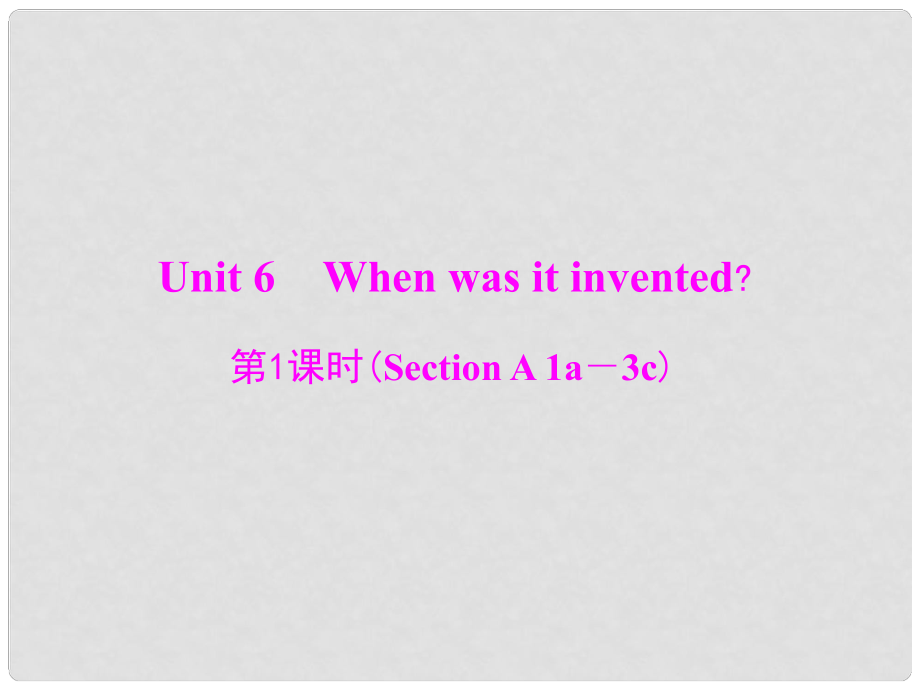《九年級英語全冊 Unit 6 When was it invented 第1課時(Section A 1a-3c)課件 (新版)人教新目標(biāo)版》由會員分享�,可在線閱讀,更多相關(guān)《九年級英語全冊 Unit 6 When was it invented 第1課時(Section A 1a-3c)課件 (新版)人教新目標(biāo)版(8頁珍藏版)》請在裝配圖網(wǎng)上搜索�。
1、Unit 6When was it invented?第1課時(Section A 1a3c)單 詞1invent點(diǎn)撥鏈接invent 做動詞����,意為“發(fā)明;創(chuàng)造���;虛構(gòu)”。inventor n發(fā)明者;發(fā)明家invention n發(fā)明物辨析invent 與 discover(1)invent 強(qiáng)調(diào)發(fā)明之物是“從無到有”����。如:Alexander Graham Bell invented the telephone in 1876. 亞歷山大格雷厄姆貝爾在 1876 年發(fā)明了電話。(2)discover 強(qiáng)調(diào)“發(fā)現(xiàn)”本來就已經(jīng)存在�,但不為人知的事物。如:Columbus discovered Amer
2�、ica in 1492.哥倫布在 1492 年發(fā)現(xiàn)了美洲。2pleasure點(diǎn)撥pleasure 是名詞���,意為“高興����;愉快���;愉快的事�;樂趣”��。如:Its a pleasure to meet you.非常高興見到你�。鏈接(1)please 可做動詞,意為“使喜歡���;使高興;使?jié)M意;討人喜歡����;令人高興”。還可做感嘆詞�,表示“請”。如:Hes a very hard man to please.他是一個很難討好的人���。(2)pleased 意為“高興的���;喜歡的”,指外物使人感到“高興���、滿意、喜歡”���, 是被修飾名詞自身的感覺。pleased 常見的結(jié)構(gòu)為: be pleased 不定式或從句��, be p
3��、leased with, bepleased at (about)��。如:Im very pleased with the performance.我對這個表演非常滿意��。(3)pleasing 意為“令人高興的����;令人滿意的”��,指某物或某人“使他人高興����、招人喜愛”,是被修飾名詞給別人的感覺��。如:These flowers are very pleasing.這些花招人喜愛��。(4)pleasant 意為“令人愉快的���;舒暢的����;非常好的��;討人喜歡的;風(fēng)趣的”���,與 pleasing 相似。如:He talked in a pleasant way.他用一種風(fēng)趣的方式交談���。短 語1be used for點(diǎn)撥
4����、be used for 意為“被用作”��,for 為介詞����,其后跟名詞、代詞或動名詞��。be used for 等同于短語 be used to dosth.���,to 為動詞不定式符號����,其后跟動詞原形����。如:This machine is used for washing clothes. This machine isused to wash clothes.這機(jī)器是用來洗衣服的����。鏈接be used as 被當(dāng)作來使用be used by 被使用be used to doing sth.become used to doing sth.習(xí)慣于做某事used to do sth.過去常常做某事2take place點(diǎn)撥take place 為比較正式的用語�,一般指非偶然性事件的“發(fā)生”�,即這種事件的發(fā)生一定有某種原因或事先的安排。take place 除意為“發(fā)生”外��,還可意為“進(jìn)行���;舉行��;開展”���。辨析take place 與happentake place 多指必然發(fā)生或經(jīng)過布置、策劃后進(jìn)行的事情�;happen 多指偶然的沒有預(yù)料到的事情的發(fā)生。如:The opening of the play will take place tomorrow night. 戲劇的首演式將于明晚舉行�。I dont know how this happened.我不知道這事是怎么發(fā)生的。
 九年級英語全冊 Unit 6 When was it invented 第1課時(Section A 1a-3c)課件 (新版)人教新目標(biāo)版
九年級英語全冊 Unit 6 When was it invented 第1課時(Section A 1a-3c)課件 (新版)人教新目標(biāo)版

